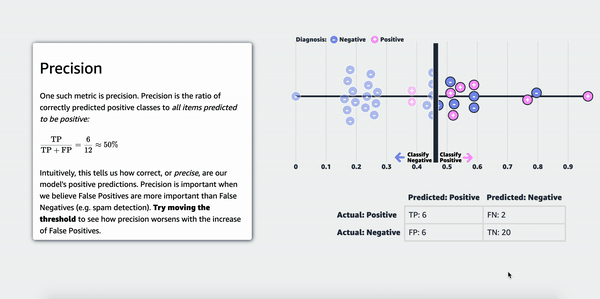Machine learning is a field in computational science that analyzes patterns and structures in data to help with learning, reasoning, and decision-making—all without human interaction. Data is the lifeblood of business, and machine learning helps identify signals among the data noise.
Machine learning (ML), a subset of artificial intelligence, is at the center of Amazon’s business. It’s used by teams across the company, from the Supply Chain Optimization team to improve its product forecasts, and the Alexa science team to revolutionize daily convenience for customers, to the Amazon Go team for enabling a checkout-free shopping experience, and by the Amazon.com team, in order to enhance customers’ shopping experiences. Moreover, Amazon Sagemaker is an AWS service that provides developers and data scientists the ability to build, train, and deploy machine learning models, attracting customers such as NASA, the National Football League and GE Healthcare.
Machine learning has the potential to transform businesses in all industries, but there’s a major limitation: demand for individuals with ML expertise far outweighs supply. That’s a challenge for Amazon, and for companies big and small across the globe.
Find more free MLU courses
Subscribe to the Machine Learning University YouTube channel to get all of the latest courses. And subscribe to the Amazon Science YouTube channel to learn about the work scientists are doing to bring products and services at Amazon to life.
To help meet that demand, Amazon founded its in-house Machine Learning University (MLU) in 2016. MLU’s curriculum is designed to sharpen the skills of current ML practitioners, while also giving neophytes the tools they need to deploy machine learning for their own projects. Classes are taught by Amazon ML experts.
Three accelerated online courses are now available and will expand to include nine more in-depth courses before year’s end. Beginning in 2021, all MLU classes will be available via on-demand video, along with associated coding materials.
The first three online courses cover natural language processing (the machine understanding of human language), computer vision (the machine understanding of images and video), and tabular data (machine learning associated to spreadsheet-like tables).
“Machine Learning University got its start from the idea that we were going to have a difficult time finding enough people with ML skills to meet our needs,” says Brent Werness, an AWS research scientist who is, in effect, MLU’s academic director. “Universities can’t develop students with ML skills fast enough for Amazon, much less for all the other companies out there.

“By going public with the classes, we are contributing to the scientific community on the topic of machine learning, and making machine learning more democratic,” Werness adds. “This field isn’t limited to individuals with advanced science degrees, or technical backgrounds. This initiative to bring our courseware online represents a step toward lowering barriers for software developers, students and other builders who want to get started with practical machine learning.”
MLU courseware is developed via several mechanisms, says Werness. Often, a class will be created to address a specific business problem, such as in computer vision, or natural language processing. In other cases, advances in machine learning suggest changes to the curriculum.
“That way we stay in touch with the business needs, and keep up with advances, such as recent improvements in state-of-the-art AutoML solutions provided by systems like AutoGluon,” says Werness.
MLU’s core curriculum is challenging, and several courses require a multi-week study of the mathematics that are foundational to ML and AI, but the program also now offers accelerated courseware, such as the initial classes being made publicly available, that give students a quick overview of a topic.
“Instead of a three-class sequence that takes upwards of 18 or 20 weeks to complete, in the accelerated classes we can engage students with machine learning right up front,” says Ben Starsky, MLU program manager. “They can get their hands dirty very quickly in the areas that will provide an opportunity to apply machine-learning concepts to solve business problems. You may not learn everything you need to know in three days, but you’ll know enough to ask, ‘Is this an opportunity for addressing my business problem?’”
MLU classes are taught by Amazon scientists, and some courseware incorporates a textbook, Dive into Deep Learning, written by Amazon scientists Aston Zhang, Mu Li, Zachary Lipton, and Alex Smola. The book offers a detailed yet accessible path toward machine-learning knowledge.
In her work with Amazon students, MLU instructor Rachel Hu says she enjoys the problems they bring into class—an experience she expects to carry over to the public online class.
“When I’m teaching a class for Amazon, I also feel like I’m learning a lot,” says Hu, an AWS applied scientist who previously was a graduate student instructor for an Introduction to Deep Learning class at the University of California, Berkeley. “That’s because students ask great questions. In industry, engineers are solving big problems every day, and those can be really interesting. That also helps us make the courses more relevant to real-world needs.”
Similar to other open-source initiatives, MLU’s courseware will evolve and improve over time based on input from the builder community.
To help make the online classes more engaging, Starsky shipped mobile recording studios to the MLU instructors. “The teachers set up the recording studios in their living rooms or basements,” he says. “That way we get better audio and video than from a webcam on a laptop.”
Demand for machine-learning classes is certain to grow as the technology pervades more and more areas of business. Werness says MLU is currently rebuilding its curriculum, in part to further integrate “Dive into Deep Learning” into class sessions.
“We want to make sure we’re teaching the important things up front and that we’re making good use of students’ time,” he says. “With the transition to working from home, it’s even harder now for class participants to set aside multiple hours of time. We want to be flexible in how people can take these classes.”


















